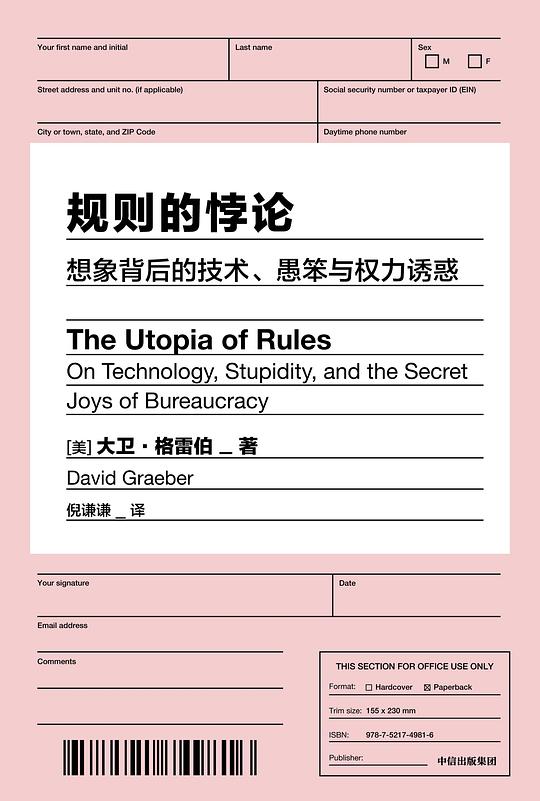
"规则的悖论:陷入愚蠢的代价"
书名:规则的悖论
1
0

唯美小少女 2023-06-02 20:01:43
David Graeber gained popularity for two reasons that generated great impact. Firstly, he was a significant participant in the Occupy Wall Street movement, committed to using his actions to change societal conditions. Secondly, he published "Bullshit Jobs", an exploration of the meaning of work. Many people are trapped in meaningless jobs that consume their lives, and he suggested ways to solve this problem.
However, as a sociologist and anthropologist, Graebers exploration did not stop there. He also created "The Utopia of Rules: On Technology, Stupidity, and the Secret Joys of Bureaucracy," which takes us on a journey to explore the patterns that develop under rules. Rules seem to be a more harmonious way of developing, and living under rules seems to make life more harmonious. But is this reality? Have rules made our lives more efficient? Have they made our work better for the future? Or have they just created a lot of "meaningless jobs"?
The author cites his personal experience in this book. He needed to sign an agreement during his mothers hospitalization, allowing him to act on behalf of her bank account and pay various bills. However, due to various rule restrictions, the author was unable to complete the process several times easily. Even after his mothers death, this procedure was still unfulfilled.
Such rules may not be convenient, and they often create myths and temptations behind the rules, which is the focus of this book. So, how are rules constructed specifically? What theoretical basis underpins them? And what efforts have the bureaucratic system made in establishing this regulatory theory?
With the authors profound insight, we will discover that all rules are established based on good wishes, but after their establishment, they often turn into paradoxes. There are many paradoxes like this around us, and those who fall into these paradoxes often face dead ends. All decisions are the product of human rationality. When these rational behaviors fall into the trap of rules, they become more and more stupid, more and more passive, and more and more opposite to rationality.
This book often has a deafening impact on readers and can help us see the other side of reality that we are rarely aware of. The author also uses many examples to satirize the impacts of these foolish rules. For example, many bureaucrats are aware of unrealistic rules and try to seek change. However, in the process of change, the number of regulations, paperwork, and bureaucrats increases, which is a modern paradox. This is the reality we are trapped in under the rules and cannot escape.
Let us explore the unknown side of rules through David Graebers profound exploration of regulations in "The Utopia of Rules."
相关推荐
萤火谷的梦想家
艾莉森•麦吉出生于1960年,是美国《纽约时报》畅销书作家,同时也是大都会州立大学创意写作课的教授。她的作品被翻译成20多种语言并出版,也曾被提名普利策奖,并获得苏斯博士奖金奖、克里斯托弗图书奖、美国 [美]艾莉森•麦吉/[美]克里斯托弗•丹尼斯/绘 2023-03-27 16:50:25鬼马女神捕1·绝密卧底(上)
腹黑凤凰vs毒舌鸡妖——蓝翎:“小姬,跟我去人界吧!”姬十四:“干吗?让人宰了我做小鸡炖蘑菇吗?”蓝翎:“不啊,让妖怪宰了你做小鸡炖蘑菇更气派。”凤凰蓝翎和鸡妖姬十四生活在无忧无虑的灵界。他们的故乡叫 郝天晓 2023-04-17 00:22:47© 2023-2025 百科书库. All Rights Reserved.












发表评价